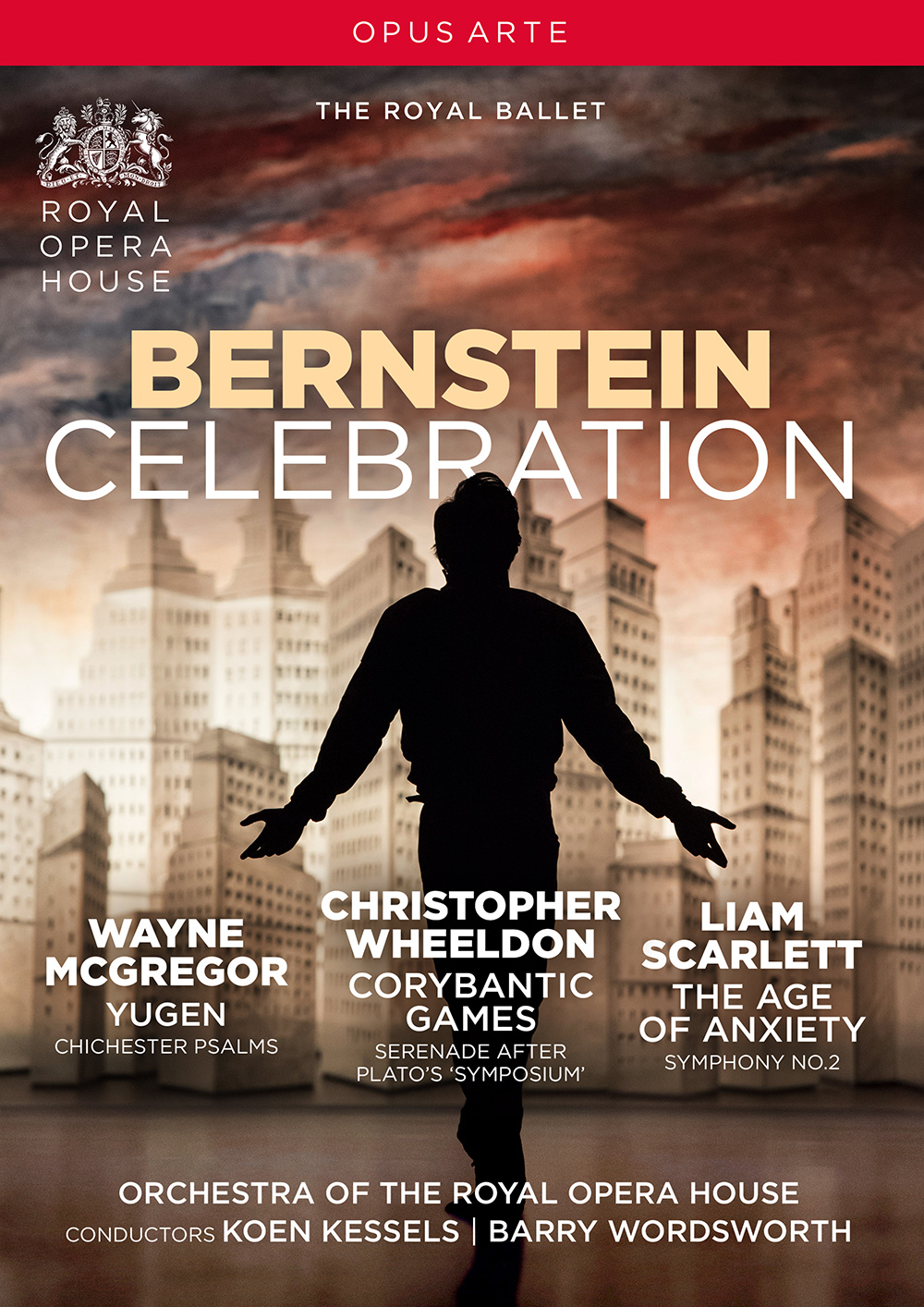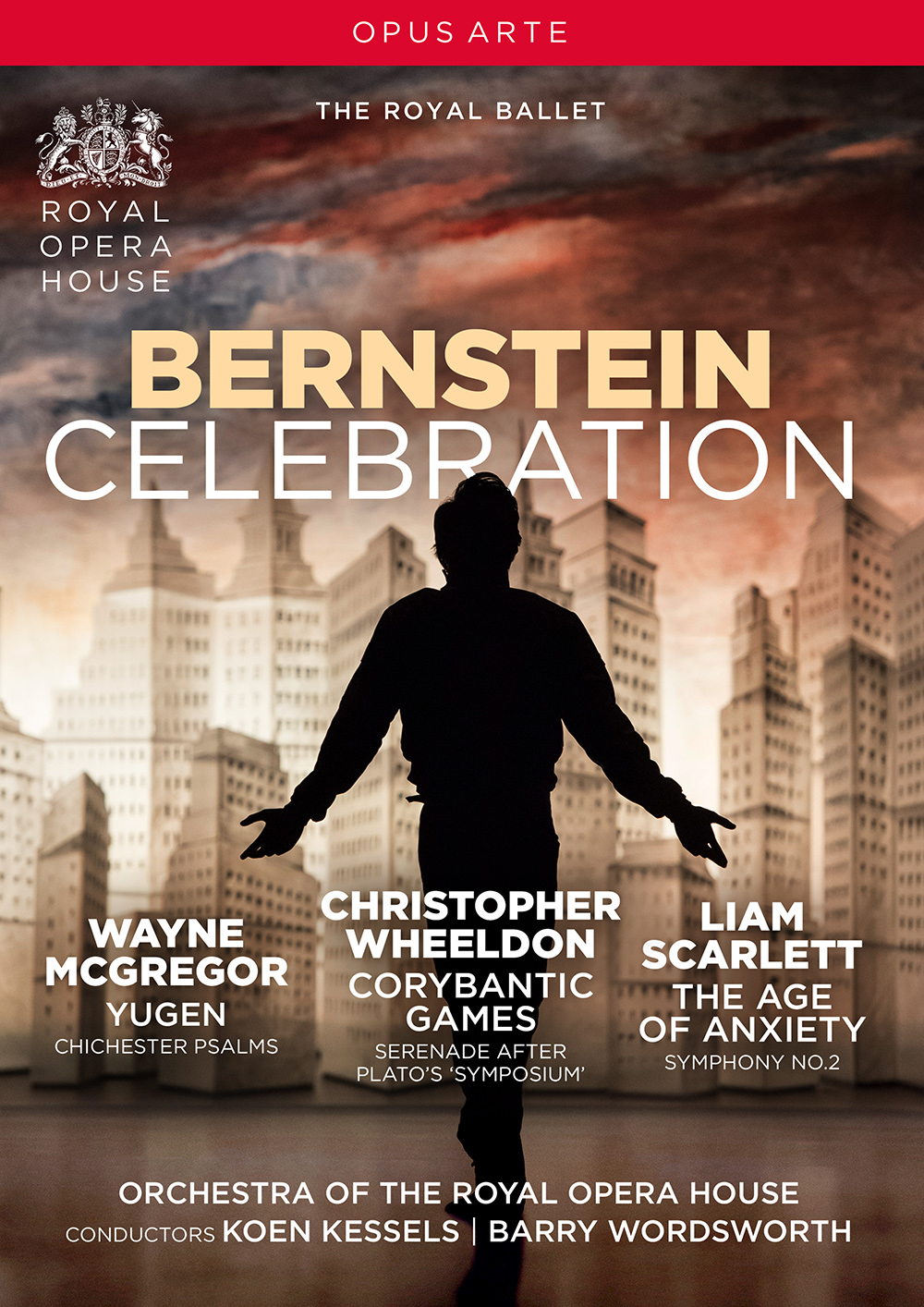Federico Bonelli (Yugen); Sarah Lamb (Yugen; The Age of Anxiety); Calvin Richardson (Yugen); Alexander Campbell (The Age of Anxiety); Bennet Gartside (The Age of Anxiety); Tristan Dyer (The Age of Anxiety); Lauren Cuthbertson (Corybantic Games); Matthew Ball (Corybantic Games); Yasmine Naghdi (Corybantic Games)
The Royal Ballet celebrates the centenary of Leonard Bernstein’s birth with this all-Bernstein collection. The Company’s three associate choreographers respond to the varied styles of Bernstein’s music in ballets that are lyrical, beautiful, exuberant and moving. Wayne McGregor’s Yugen is set to Chichester Psalms. In The Age of Anxiety Liam Scarlett uses Bernstein’s response to W.H. Auden’s poem. Corybantic Games by Christopher Wheeldon responds to the Serenade after Plato’s ‘Symposium’. Filmed in High Definition and recorded in true Surround Sound.
DVD
BLU-RAY
Koen Kessels (Yugen / Corybantic Games); Barry Wordsworth (The Age of Anxiety)
Orchestra of the Royal Opera House; Royal Opera Chorus
Federico Bonelli; Sarah Lamb; Calvin Richardson; Alexander Campbell; Bennet Gartside; Tristan Dyer; Lauren Cuthbertson; Matthew Ball; Yasmine Naghdi; Orchestra of the Royal Opera House; Royal Opera Chorus; Koen Kessels (Yugen / Corybantic Games); Barry Wordsworth (The Age of Anxiety)
There’s a pure drama of contrasts in the opening moments that remind me of McGregor’s Chroma. Eleven dancers stand silent and silhouetted within the luminous spaces of Edmund de Waal’s set; and the world seems to hold its breath before the first notes of the music blast through it. McGregor’s choreography is expertly musical, seeking out the lyricism of Bernstein’s melodies in long, floating lines, and riding its energies in such cleverly massed configurations that his modest ensemble can look like a tribe.
As the work unfolds we identify Calvin Richardson as its central figure – a wanderer in exile, seeking faith and consolation – with Federico Bonelli and Sarah Lamb as his supporting companions. McGregor expertly conveys emotions as much through the movement’s dynamics as its figurative imagery: the eerie beauty of the lone treble chorister singing Psalm 23 is made touchingly human by the questioning, quivering tension in Richardson’s own solo. When he’s joined by Lamb and Bonelli for Psalm 131 (“Surely I have calmed and quieted myself”), it’s the space between the dancers that speaks as eloquently as their gently interlacing moves.
CORYBANTIC GAMES - There’s a cleverly sustained line of narrative, too, in Corybantic Games, Christopher Wheeldon’s setting of Serenade. But rather than referencing the text that inspired Bernstein’s music – Plato’s Symposium on Love – Wheeldon conjures a more generic classical world of athletes, acolytes and lovers, presided over by Tierney Heap as an Amazonian goddess. Dressed by fashion designer Erdem in an elegant if slightly fussy fusion of 1950s corsetry and Greek drapery, and framed by the abstract temple architecture of Jean-Marc Puissant’s set, the cast take on the colours and qualities of the music as it moves from the burnished, magisterial first movement to the joyous hurtling virtuosity of Marcelino Sambé and Mayara Magri’s duet to the exquisite drowse of the fourth movement, lit by Peter Mumford to the blue of a Mediterranean twilight. Finally, in a Dionysiac finale, a regally implacable Heap whips the entire cast through a cascade of showstopping, kaleidoscopic configuration." (The Guardian ★★★★)
"YUGEN - Against celebrated artist and author Edmund de Waal’s grand backdrop of tall, hollow cubes that hint subtly at cathedral windows – complemented by Lucy Carter’s lighting and tasteful red costumes by Shirin Guild – McGregor swiftly has the stage teeming with motion. He deploys his traditionally often overdone tropes with notable restraint and judgment, and the choreography treats the female dancers with respect.
Throughout, McGregor also responds sensitively to both words and music. In Part II, he makes particularly tender use of the famous Psalm 23:1-4, here an exquisite passage for solo boy treble and harp (take a bow, young William Davies), and soon has three couples simultaneously engaging with each other with an intensity that borders on desperation. Added choreographic elements in Part III – an attractive but not overly mimetic prayer-like quality to the steps; a lovely little moment where a trio advance towards us as if threading a human braid – complement a short, attractive, mature work that the dancers respond to with what looks like genuine enthusiasm.
On which subject, if Sarah Lamb very ably dominates the show, and Federico Bonelli et al provide excellent support, it is impossible not to mention the (rather under-used) Francesca Hayward, so light and so musical that she at times seems able to move in two directions at the same time.
CORYBANTIC GAMES - The evening’s other novelty is by the first-rate neo-classicist (and artistic associate of the Royal Ballet) Christopher Wheeldon. A direct but less literal-minded descendant of Corybantic Ecstasies – also set to Bernstein’s Serenade after Plato’s “Symposium” – which he made in 1999 for Boston Ballet, Corybantic Games is a five-parter for a large ensemble, and it sees Wheeldon making a return to abstraction after a long run of narrative works.
A little like McGregor in Yugen, he deftly deploys contrapuntal little groups of dancers at the rear of the stage, and also whips up nice, sensual little clusters at the fore. I also particularly enjoyed a luxuriant solo for Beatrix Stix-Brunel in Part II, as well as Part IV’s three couples (a curious tic of the evening): to an especially stirring passage of Bernstein’s, they intensely and lyrically explore various aspects and permutations of love." (The Daily Telegraph)
"THE AGE OF ANXIETY - The piece has moments that catch at the heart. Many come courtesy of Bennet Gartside, the only one of the central quartet (the others are Sarah Lamb, Tristan Dyer and Alexander Campbell) who is capable of uniting the universal and the particular in his acting; he is both the specific lonely businessman called Quant and all lonely people everywhere. When Gartside turns away from the group towards the dark emptiness at the side of the stage and briefly opens both hands at his sides in silent question, this muted gesture overshadows all the despairing gyrations of the solo that follows. Likewise the subtly shifting points of contact between the four characters as they pause in mutual awe of the sunrise seem to have more than transient significance." (The Arts Desk)
Federico Bonelli (Yugen); Sarah Lamb (Yugen; The Age of Anxiety); Calvin Richardson (Yugen); Alexander Campbell (The Age of Anxiety); Bennet Gartside (The Age of Anxiety); Tristan Dyer (The Age of Anxiety); Lauren Cuthbertson (Corybantic Games); Matthew Ball (Corybantic Games); Yasmine Naghdi (Corybantic Games)
The Royal Ballet celebrates the centenary of Leonard Bernstein’s birth with this all-Bernstein collection. The Company’s three associate choreographers respond to the varied styles of Bernstein’s music in ballets that are lyrical, beautiful, exuberant and moving. Wayne McGregor’s Yugen is set to Chichester Psalms. In The Age of Anxiety Liam Scarlett uses Bernstein’s response to W.H. Auden’s poem. Corybantic Games by Christopher Wheeldon responds to the Serenade after Plato’s ‘Symposium’. Filmed in High Definition and recorded in true Surround Sound.
DVD
BLU-RAY
Koen Kessels (Yugen / Corybantic Games); Barry Wordsworth (The Age of Anxiety)
Orchestra of the Royal Opera House; Royal Opera Chorus
Federico Bonelli; Sarah Lamb; Calvin Richardson; Alexander Campbell; Bennet Gartside; Tristan Dyer; Lauren Cuthbertson; Matthew Ball; Yasmine Naghdi; Orchestra of the Royal Opera House; Royal Opera Chorus; Koen Kessels (Yugen / Corybantic Games); Barry Wordsworth (The Age of Anxiety)
There’s a pure drama of contrasts in the opening moments that remind me of McGregor’s Chroma. Eleven dancers stand silent and silhouetted within the luminous spaces of Edmund de Waal’s set; and the world seems to hold its breath before the first notes of the music blast through it. McGregor’s choreography is expertly musical, seeking out the lyricism of Bernstein’s melodies in long, floating lines, and riding its energies in such cleverly massed configurations that his modest ensemble can look like a tribe.
As the work unfolds we identify Calvin Richardson as its central figure – a wanderer in exile, seeking faith and consolation – with Federico Bonelli and Sarah Lamb as his supporting companions. McGregor expertly conveys emotions as much through the movement’s dynamics as its figurative imagery: the eerie beauty of the lone treble chorister singing Psalm 23 is made touchingly human by the questioning, quivering tension in Richardson’s own solo. When he’s joined by Lamb and Bonelli for Psalm 131 (“Surely I have calmed and quieted myself”), it’s the space between the dancers that speaks as eloquently as their gently interlacing moves.
CORYBANTIC GAMES - There’s a cleverly sustained line of narrative, too, in Corybantic Games, Christopher Wheeldon’s setting of Serenade. But rather than referencing the text that inspired Bernstein’s music – Plato’s Symposium on Love – Wheeldon conjures a more generic classical world of athletes, acolytes and lovers, presided over by Tierney Heap as an Amazonian goddess. Dressed by fashion designer Erdem in an elegant if slightly fussy fusion of 1950s corsetry and Greek drapery, and framed by the abstract temple architecture of Jean-Marc Puissant’s set, the cast take on the colours and qualities of the music as it moves from the burnished, magisterial first movement to the joyous hurtling virtuosity of Marcelino Sambé and Mayara Magri’s duet to the exquisite drowse of the fourth movement, lit by Peter Mumford to the blue of a Mediterranean twilight. Finally, in a Dionysiac finale, a regally implacable Heap whips the entire cast through a cascade of showstopping, kaleidoscopic configuration." (The Guardian ★★★★)
"YUGEN - Against celebrated artist and author Edmund de Waal’s grand backdrop of tall, hollow cubes that hint subtly at cathedral windows – complemented by Lucy Carter’s lighting and tasteful red costumes by Shirin Guild – McGregor swiftly has the stage teeming with motion. He deploys his traditionally often overdone tropes with notable restraint and judgment, and the choreography treats the female dancers with respect.
Throughout, McGregor also responds sensitively to both words and music. In Part II, he makes particularly tender use of the famous Psalm 23:1-4, here an exquisite passage for solo boy treble and harp (take a bow, young William Davies), and soon has three couples simultaneously engaging with each other with an intensity that borders on desperation. Added choreographic elements in Part III – an attractive but not overly mimetic prayer-like quality to the steps; a lovely little moment where a trio advance towards us as if threading a human braid – complement a short, attractive, mature work that the dancers respond to with what looks like genuine enthusiasm.
On which subject, if Sarah Lamb very ably dominates the show, and Federico Bonelli et al provide excellent support, it is impossible not to mention the (rather under-used) Francesca Hayward, so light and so musical that she at times seems able to move in two directions at the same time.
CORYBANTIC GAMES - The evening’s other novelty is by the first-rate neo-classicist (and artistic associate of the Royal Ballet) Christopher Wheeldon. A direct but less literal-minded descendant of Corybantic Ecstasies – also set to Bernstein’s Serenade after Plato’s “Symposium” – which he made in 1999 for Boston Ballet, Corybantic Games is a five-parter for a large ensemble, and it sees Wheeldon making a return to abstraction after a long run of narrative works.
A little like McGregor in Yugen, he deftly deploys contrapuntal little groups of dancers at the rear of the stage, and also whips up nice, sensual little clusters at the fore. I also particularly enjoyed a luxuriant solo for Beatrix Stix-Brunel in Part II, as well as Part IV’s three couples (a curious tic of the evening): to an especially stirring passage of Bernstein’s, they intensely and lyrically explore various aspects and permutations of love." (The Daily Telegraph)
"THE AGE OF ANXIETY - The piece has moments that catch at the heart. Many come courtesy of Bennet Gartside, the only one of the central quartet (the others are Sarah Lamb, Tristan Dyer and Alexander Campbell) who is capable of uniting the universal and the particular in his acting; he is both the specific lonely businessman called Quant and all lonely people everywhere. When Gartside turns away from the group towards the dark emptiness at the side of the stage and briefly opens both hands at his sides in silent question, this muted gesture overshadows all the despairing gyrations of the solo that follows. Likewise the subtly shifting points of contact between the four characters as they pause in mutual awe of the sunrise seem to have more than transient significance." (The Arts Desk)































